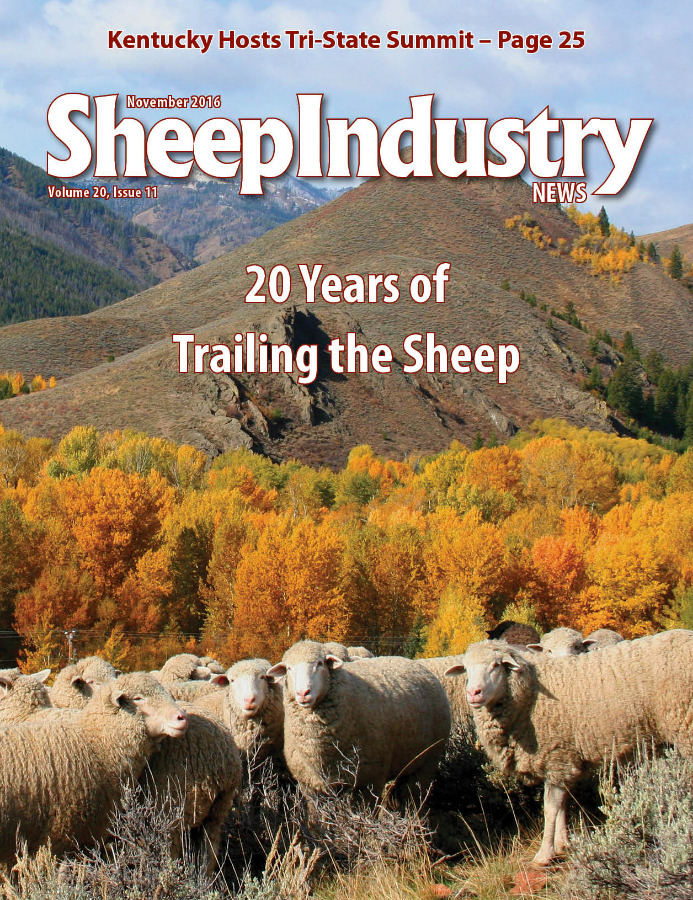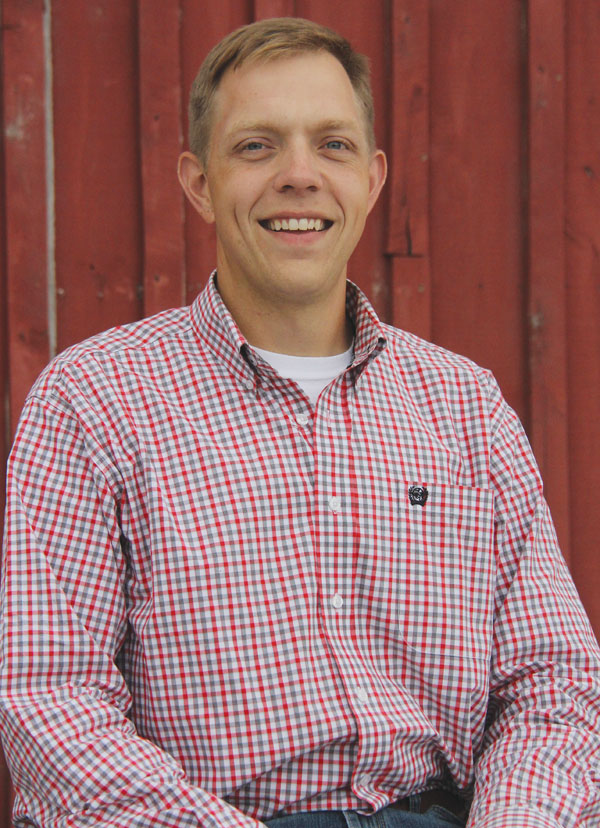
- November 2016
- President’s Notes
- Better Genetics Equals More Profit
- Thomans Concede Allotments
- 20 Years of Trailing the Sheep
- Celebrating Fall at Savage Hart Farm
- New Staff, Consultants on ASI Payroll
- ASI News
- Tri-State Summit Celebrates Growth
- Young Entrepreneur: Matt Anderson
- Knowles Named to Scientific Panel
- Range Productivity Study Complete
- USDA Confirms Screwworm in Florida
- Market Report
- Obituary
Young Entrepreneur: Matt Anderson, Danville, Kentucky
When Matt Anderson joined ASI’s Young Entrepreneurs Committee in 2015, his first instinct was to sit tight and keep his mouth shut. But the lifelong shepherd and current FFA advisor at Boyle County Middle School soon realized he had plenty to add to the conversation during the committee’s regular conference calls. The family operation in Hustonville, Ky., might only include 130 ewes, but still shares many of the same goals as larger range operations.
 We want the best genetics for our animals, we want hardy animals that are going to survive and we want them to produce a good fleece and a carcass that the consumer likes. On the purebred and registered side, we also want them to be pretty. Acacia (Matt’s wife of two years) has a sheep background, as well. Her uncles had large flocks that they would run through the Crown Forest in Canada, where she’s from. To hear their side of sheep farming goes to show how diverse the industry is. But from the large producer to the small grower, we’re all kind of working toward the same goal.
We want the best genetics for our animals, we want hardy animals that are going to survive and we want them to produce a good fleece and a carcass that the consumer likes. On the purebred and registered side, we also want them to be pretty. Acacia (Matt’s wife of two years) has a sheep background, as well. Her uncles had large flocks that they would run through the Crown Forest in Canada, where she’s from. To hear their side of sheep farming goes to show how diverse the industry is. But from the large producer to the small grower, we’re all kind of working toward the same goal.
My parents acquired some sheep the year I was born. At that time, they had all species of livestock, including hogs, dairy cattle, beef cattle and sheep. This was when we were living in Connecticut. As urban sprawl sort of set in there, they decided that it was time to move. They couldn’t have the operation they wanted there, so after a few years of looking they decided to settle in Kentucky and found a place. The only species we brought with us were the sheep. We loaded up 53 registered ewes and since then our flock of purebred sheep has expanded to include 60 Dorsets, 24 Tunis and about 18 Montadale ewes. We also have some replacements and the rams that we use. From those, we raise replacements and purebred animals for sale. Anything that doesn’t make the cut in the show ring is raised as a commercial feeder lamb. Acacia and I have a third interest in the flock, my parents have a third and my sisters have a third. It works out well because that is kind of how the work divides out. We’re small time, but the sheep we have are good sheep. We really like raising purebred sheep. We show across the country.
When my original teaching position in Kentucky was eliminated, I just decided to move up to Alberta because Acacia had a stable job up there at the time. Things were good, but we moved back in January 2015. When we found out she was pregnant (with Maeve, now 15 months old), it motivated us to try and find a way for her to stay home. I was applying for things at schools and university positions. Then, out of the blue, my mom called and said she had run into Jim Mansfield (with Four Hills Farm in Salvisa, Ky.) at the stockyards. He wanted my number because he was looking for a farm manager as he expanded his Katahdin operation. I didn’t even know if it would work out at first because he wanted someone there like the next week, and I was two months out. But we ended up making it work. It was a great experience because he’s just such a great guy to work for. He has a really good operation and great market setup. But in terms of security and doing what I really love, it just wasn’t exactly what I was looking for.
As soon as I got started with Jim, he told me about his role with ASI and the committees he serves on, and he wanted me to get as involved as possible with all of that. I was a little apprehensive at first having taken a new job and hearing about being on this committee. But I started to sit in on the conference calls. It was great to hear everyone’s interest and passion for the sheep. Whenever I get started with something, I do a lot more listening than I do talking. But, they were looking for some mechanical things on how to streamline things at the conference and I was able to offer some input on that because I’ve attended a lot of similar conferences.
In August 2015, I got a call that they were starting a middle school FFA program. A good friend of mine teaches the high school program here, and she said that there’s going to be an opening and they’d love to have me back in the classroom. That was an opportunity I couldn’t pass up. I think it will also put us more on track to having our own operation and eventually taking over what my parents have built.
I had a conversation with my mom recently about the operation. She got a degree in animal science and always wanted to be that full-time farmer. So, she works on the farm and my dad has an off-farm job. But she’s not always open to some new ideas. When you have a flock of sheep, you have to take care of the farm and the land and be a good steward in that regard just as much as you’re taking care of the sheep. Her focus is 99 percent on the sheep, so she doesn’t always worry about the other things. I think we could do a better job with rotational grazing, for instance. We also shear all of our own sheep – my dad does half and I do half. I’d definitely like to see that change.

